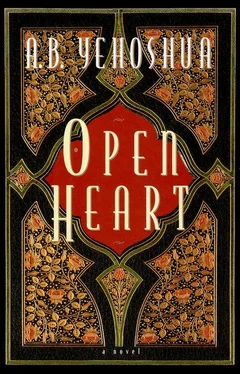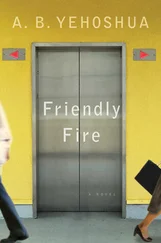A. Yehoshua - Open Heart
Здесь есть возможность читать онлайн «A. Yehoshua - Open Heart» весь текст электронной книги совершенно бесплатно (целиком полную версию без сокращений). В некоторых случаях можно слушать аудио, скачать через торрент в формате fb2 и присутствует краткое содержание. Год выпуска: 2014, Издательство: Peter Halban, Жанр: Современная проза, на английском языке. Описание произведения, (предисловие) а так же отзывы посетителей доступны на портале библиотеки ЛибКат.
- Название:Open Heart
- Автор:
- Издательство:Peter Halban
- Жанр:
- Год:2014
- ISBN:нет данных
- Рейтинг книги:3 / 5. Голосов: 1
-
Избранное:Добавить в избранное
- Отзывы:
-
Ваша оценка:
- 60
- 1
- 2
- 3
- 4
- 5
Open Heart: краткое содержание, описание и аннотация
Предлагаем к чтению аннотацию, описание, краткое содержание или предисловие (зависит от того, что написал сам автор книги «Open Heart»). Если вы не нашли необходимую информацию о книге — напишите в комментариях, мы постараемся отыскать её.
Open Heart — читать онлайн бесплатно полную книгу (весь текст) целиком
Ниже представлен текст книги, разбитый по страницам. Система сохранения места последней прочитанной страницы, позволяет с удобством читать онлайн бесплатно книгу «Open Heart», без необходимости каждый раз заново искать на чём Вы остановились. Поставьте закладку, и сможете в любой момент перейти на страницу, на которой закончили чтение.
Интервал:
Закладка:
But I was pleased with myself and with the first clear sign of the emotion that I had succeeded in conveying to this woman. Although I knew it was all hopeless and absurd — and even if it had a chance, it wouldn’t lead anywhere — I still refused to crush my love with my own hands but wanted this woman, who had appeared after long years of emotional desolation, of lovelessness, to crush it herself, with the same charm with which she crushed those long cigarettes of hers, which Lazar regarded with hostility and sometimes with outright protest. Therefore I said to myself, You have to rent that apartment, come what may. And since I found it difficult to go to sleep anyway after my day of deep rest, and the view from my window showed clearly that the storm was finally over, I could not resist putting on my leather coat and helmet and riding at a leisurely pace back to the street and the building where I already saw myself as a tenant. In the dark I inspected the neighborhood and the shops, and figured out whether I would be able to park the Honda under the building’s pillars. I was pleased by everything I saw, including the short distance from the apartment to the sea, which I covered in a few minutes as I drove right down to the beach, where I stood for a long time opposite the waves breaking enthusiastically on the shore, still faithful to the storm which had disappeared without a trace.
Now a period of uncertainty began. In the personnel department of the hospital I was registered as an employee on vacation, but in actual fact I was up in the air, waiting for Professor Levine to recover from an illness whose nature suddenly seemed suspect. The secretary of the department and also the nurses put me off with vague replies on the telephone, until I decided to go to the hospital myself and have lunch in the staff cafeteria in order to bump into someone from internal medicine who would be able to shed some light on the situation. At first I thought of dropping into the surgical ward and retrieving the coat with my name embroidered on it before it disappeared, as personal possessions had a way of disappearing in the hospital. But at the last minute I changed my mind, because I didn’t want to bump into Hishin or any of the other doctors, who would ask me questions about my unclear future. So I entered the cafeteria without my white coat, wearing my black leather jacket and holding my crash helmet in my hand. As soon as I walked in I saw Hishin sitting over the remains of his meal with other doctors and nurses from the department, smoking, arguing, and gesticulating. I tried to keep out of sight and took my tray to the opposite corner, where I looked for a familiar face from the internal medicine department. But I couldn’t see any internists I knew. I sat down at a little table that was still covered with what was left of someone else’s meal, and for the first time I found myself feeling faintly nauseated by the hospital smell rising from the food in front of me. The cafeteria, which I had always regarded as a pleasant refuge, now seemed to me, after the quiet days I had spent in my apartment, noisy and ugly. I left most of the food on my plate, and slowly ate the pink pudding which I had always enjoyed. Suddenly a hand came down on my shoulder, and even before turning my head I knew by the lightness of its touch that it belonged to Hishin. He was standing over me with his entire team, even the old anesthetist Dr. Nakash, all in the green uniforms of the operating room. They looked pleased with themselves, as if they had just successfully concluded a complicated operation. “What’s the matter with you? Are you boycotting us?” he asked gently, bending down and looking at me with pitying, sympathetic eyes. And before I could reply, he shook his head sadly and said, “Don’t be angry with everyone because of me. They’re not to blame.” Now I realized that it had been a mistake to ignore them and sit by myself. “And you are to blame?” I decided to adopt a tone of indignant protest and honest surprise. “You’re quite wrong. I’ve got no complaints. The trip to India turned out to be fantastic. Why should I be angry with you when I know that you’ve got my best interests at heart?” I looked straight into his eyes. He was taken aback by my words; in spite of the seriousness and sincerity of my tone, he was sure that they hid a subtle sarcasm he couldn’t quite put his finger on. He looked around at his team, trying to read my intention on their faces, but they all looked away, as embarrassed as he was. Then he apparently decided to take my words at face value, and placed his hand lightly on my shoulder again, nodded his head, and took off with the rest of them, except for the anesthetist, who wanted to talk to me. Dr. Nakash was a man of about sixty-five, thin and bony, whose white hair, clustered around his bald pate, becomingly contrasted the darkness of his complexion. In India I had seen quite a few people who reminded me of Nakash, which gave me a feeling of sympathic closeness with him. Hishin respected him and preferred to work with him, even though he was not the most senior of the anesthetists. “Nakash doesn’t always understand what’s going on in the operation,” Hishin would say behind his back, “but he’s always alert, even in ten-hour operations. And that’s the most important thing. Because the patient abandons himself not to the hands of his surgeon but to the hands of his anesthetist.”
Now Nakash asked me when I was starting work in internal medicine. I told him that I was waiting for Professor Levine to recover. “Isn’t he out of there yet?” said Nakash in surprise. “Out of where?” I asked, and Nakash revealed with complete naturalness the secret that up to now everyone had succeeded in keeping from me: “They clean his head out,” he said in his direct, simple way, “and he comes out fresh and new, until he gets depressed and commits himself again. What can he do? His patients depress him, and he can’t cut them open like Hishin does.” After that he asked me if I was interested in having work as his assistant in operations at a private hospital. Lately they had been very strict about the anesthetist having an assistant. The pay was strictly by the hour, without all the extras and under-the-counter payments, but the fee was high, tax-free, and unambiguous. “But I have no training as an anesthetist,” I said, surprised. Nakash insisted, though, that the art of anesthesiology was not beyond my understanding; the technical side was simple and could be quickly learned, and the main thing was not to abandon the patient, to think of his soul and not only of his breathing.
While the surgeon and his team concentrate on a small part of the patient, he explained, only the anesthetist is thinking all the time of the patient as a whole, not as a collection of parts. The anesthetist is the real internist, no matter how much the surgeon pokes around in the patient’s innermost organs. “And you,” Nakash added, concluding his little speech, which surprised me by its eloquence, “want to be an internist.”
“Want? Not exactly,” I said with a bitter smile. “I haven’t got a choice.”
“I thought you were being sincere when you admitted that Hishin made the right decision. Believe me, Benjy, I’ve been through a lot of surgeons in my time. Who knows them as I do? And I’m telling you, I’ve seen you at work, and it’s not for you. Your scalpel hesitates, because it thinks too much. Not because you’re inexperienced, but because you’re too responsible. And in surgery too much responsibility is fatal. You have to take a risk; to cut a person up and still tell him it’s good for him, you have to be partly a charlatan and partly a gambler. Look at Hishin — who, by the way, also performs private operations sometimes, so you’ll be able to stand next to him in the operating room again, if you miss it so much.” The offer was so tempting that I didn’t even ask for time to think it over, and said immediately yes. Nakash was not surprised. “I knew you’d like the idea, and anyway you’re at loose ends until Professor Levine gets out and finds time to cross-examine you about that blood transfusion you performed in India. He’s a difficult customer; he’s always trying to depress his colleagues in the department, and when he doesn’t succeed he gets depressed himself. So if I were you, I wouldn’t be in too much of a hurry to fall into his hands.” I wrote down Nakash’s phone number at home, and he wrote down mine. “But it’s only temporary,” I warned him. “I’m moving into a new apartment soon.”
Читать дальшеИнтервал:
Закладка:
Похожие книги на «Open Heart»
Представляем Вашему вниманию похожие книги на «Open Heart» списком для выбора. Мы отобрали схожую по названию и смыслу литературу в надежде предоставить читателям больше вариантов отыскать новые, интересные, ещё непрочитанные произведения.
Обсуждение, отзывы о книге «Open Heart» и просто собственные мнения читателей. Оставьте ваши комментарии, напишите, что Вы думаете о произведении, его смысле или главных героях. Укажите что конкретно понравилось, а что нет, и почему Вы так считаете.












